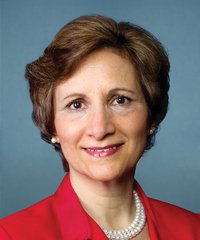
Congresswoman Suzanne Bonamici represents the First Congressional District of Oregon, which includes Washington, Yamhill, Clatsop, and Columbia counties and part of Multnomah County.
Strengthening public education is one of Suzanne's top priorities and one of the reasons she got involved in public service. Suzanne spent hundreds of hours volunteering in public schools before serving in the Oregon State Legislature, where she passed legislation to reduce duplicative testing. In Congress, she is a leader on the Education and Labor Committee and Chair of the Subcommittee on Civil Rights and Human Services.
It is an honor to serve on the Select Committee on the Climate Crisis. After more than a year of hearings, meetings, and briefings, we now present our report: “Solving the Climate Crisis: The Congressional Action Plan for a Clean Energy Economy and a Healthy, Resilient, and Just America.”
Watch me discuss the Climate Action Plan
Our committee was charged with crafting a bold, science-based, comprehensive climate action plan to address the climate crisis and reach net-zero emissions no later than mid-century and net-negative thereafter. We included a focus on the needs of frontline communities, opportunities to accelerate our transition to a 100 percent clean energy economy, and ways to create good-paying jobs. There was an outpouring of input from thousands of community members and leaders from Oregon and around the country. This work is a roadmap, and now is the time for action. I will keep working with my colleagues to enact these policies; the future of our planet depends on it.
My announcement of the comprehensive Climate Action Plan
Find Specific Factsheets Here from the Select Committee on the Climate Crisis
Track Our Legislative Progress
As we know too well in Northwest Oregon, climate change is already our reality. The science is clear and alarming, and we must act immediately. According to an independent analysis and modeling, implementing this Climate Action Plan would:
Economic, environmental, and racial justice are intertwined, and equity is at the core of our Climate Action Plan. Addressing the climate crisis will create millions of good-paying, high-quality jobs that can help working families and displaced workers recover from the economic collapse caused by the COVID-19 pandemic. Low-income communities, communities of color, and Tribal and Indigenous communities have not only been hardest hit by the COVID-19 pandemic; they have also been disproportionately affected by the climate crisis. Building a resilient, clean economy using this climate action framework will boost our economic recovery and allow us to begin to repair the legacy of environmental racism and pollution that has burdened low-income communities and communities of color for decades.
Climate Action Now
The climate crisis demands immediate action. As we worked to develop the comprehensive Climate Action Plan, I continued to move forward legislation and concrete steps to address the climate crisis. Here are some of my climate actions this Congress:
As Co-Chair of the House Oceans Caucus and Congressional Estuary Caucus, I know that the health of our ocean reflects the health of our planet. For far too long the ocean has taken the brunt of our inaction to address the climate crisis. Investing in the restoration and resilience of our ocean and coastal ecosystems will jumpstart the economy and help capture the power of our ocean to mitigate the climate crisis. Check out these articles and videos to learn more about my work to advance ocean-centric climate solutions:
Capturing the Power of the Ocean to Help Solve the Climate Crisis
Working Wild Wetlands: How Our Coastal Communities Can Mitigate the Climate Crisis
Revitalizing Coastal Communities: World Oceans Day Webinar
The Climate Action Plan incorporates many of my bills, including:
How We Developed the Climate Action Plan
The process to develop our comprehensive climate action plan was robust. The Select Committee held 17 official hearings and six member-level round table discussions on a broad range of topics:
The Select Committee also requested information from experts and the public, receiving more than 700 substantive responses from stakeholders across the country.
I am deeply grateful to these stakeholders in the Pacific Northwest for sharing your expertise and knowledge with the Select Committee: Affiliated Tribes of Northwest Indians, BlueGreen Alliance, City of Portland, Climate Solutions, Citizens' Climate Lobby, Coastal Universities Coalition, Consortium for Ocean Leadership, Confederated Tribes of Siletz Indians, CREST, CRITFC, Ecotrust, IOOS Association, Lower Columbia Estuary Partnership, Mayor Lucy Vinis of Eugene, Nuscale, NANOOS, NERRA, Oregon Association of Nurseries, Oregon Institute of Technology, Oregon Renewable Energy Center, Oregon Sea Grant, Dr. Jack Barth, Oregon State University, Dr. Timothy Cowles, Oregon State University, Oregon Wild, Oregon Winegrowers Association, Organic Materials Review Institute, Our Children's Trust, The PEW Charitable Trusts, Portland General Electric Company, Public Power Council, REI Co-op, Renewable Northwest, Restore America's Estuaries, Shellfish Growers Climate Coalition, State of Oregon, Strid Energy Report, The Nature Conservancy, Professor Greg Dotson and instructor Deb Mailander at the University of Oregon School of Law and students: Grace Brahler, Mari Galloway, Conor Harrington, Tom Housel, Whit Koch, Jake Miller, Catherine Pratt, Alexandria Roullier, Renee Seacor, and Sierra Waechter, University of Oregon: Sustainable Cities Institute, WildEarth Guardians, XPRIZE Foundation, and Zero Energy Ready Oregon.
What’s Next
This comprehensive Climate Action Plan is a roadmap for Congress. In the coming months I will continue to work with my colleagues to advance the legislation and recommendations. I also look forward to discussing the Climate Action Plan in depth with Oregonians and hearing your feedback. I will be convening roundtable discussions with stakeholders and planning a climate action tour to the places and people in Northwest Oregon who are leading the way on protecting our planet, creating good-paying jobs, supporting a just transition, and building more resilient communities.
You can follow along on social media using #OregonClimateAction.